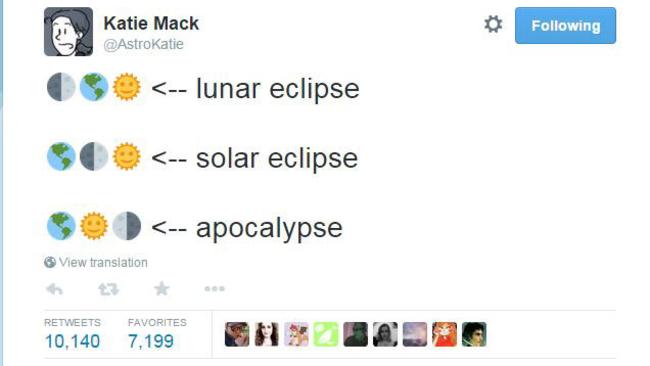Stop blaming the moon: Scientist says ‘poor mental hygiene’ is bending our thoughts
THINK there’s a connection between the full moon and human behaviour? Think again, scientists say: You’re suffering from ‘poor brain hygiene’.
FROM brawls to births, accidents to Armageddon: We always seem to end up blaming the moon. Stop it: It has nothing to do with reality, an irked scientist says.
There’s a full moon this weekend.
Police blame it when crowds turn disorderly.
Paramedics blame it when there’s a rush on the delivery rooms.
Priests find ways to turn the full moon into signs of an Apocalypse (this weekend’s will turn the colour of blood).
“It must be a full moon,” is the common refrain.

But Professor of planetary astronomy Jean-Luc Margot has come out fighting on behalf of the silent accused: “The moon is innocent.”
Get real, Professor Margot says.
“Perhaps we can start by correcting our delusions about the moon, and work from there,” he said.

IT’S ALL ABOUT BIAS
It’s a preconceived notion, the University of California, Los Angeles professor states.
And dozens of studies have proven the belief is unfounded.
The professor has added new fuel to the fire: “Study illustrates how intelligent and otherwise reasonable people develop strong beliefs that, to put it politely, are not aligned with reality.”
It’s called confirmation bias.
Enjoy Easter. It could be your last. Or not. Yes - there's yet another armageddon prophecy. http://t.co/QS2qHD0GyN pic.twitter.com/rn7IK5Iihe
— Jamie Seidel (@JamieSeidel) April 1, 2015“When life is hectic on the day of a full moon, many people remember the association because it confirms their belief,” a statement by the university reads.
“Hectic days that do not correspond with a full moon are promptly ignored and forgotten because they do not reinforce the belief.”
So, if a moon is full and there’s a string of fights — police remember this. When it’s not there, they don’t notice.

CONVICT ACCORDING TO EVIDENCE
The cost of such flawed thinking can be enormous, Professor Margot says.
He compares belief in the power of the moon to influence our moods and lives to that of the anti-vaccination movement.
“Vaccines are widely and correctly regarded as one of the greatest public health achievements, yet vaccine-preventable diseases are killing people because of beliefs that are out of step with scientific facts,” he said.
Relying on such biases is not uncommon: A 2005 survey revealed three out of four US citizens believe in ghosts, witches or astrology. Six per cent believe the moon landings were a hoax.
Has Mars been nuked? No. This MOM image shows us what we already know - a canyon and a crater. http://t.co/l8uVHBgSBG pic.twitter.com/UVDLnMEnX3
— Jamie Seidel (@JamieSeidel) March 9, 2015But education is not the answer, he says.
Promoting healthy thinking habits is.
“Allowing your brain to develop beliefs that are inconsistent with indisputable facts is poor brain hygiene. It’s like allowing your teeth to decay.
“Allow yourself to change your beliefs. The willingness to revise beliefs is necessary to secure a more accurate view of the world. The method that has given us cars, cell phones, and decades of increased life expectancy relies on examining beliefs and abandoning them, as necessary.”
The upshot?
“Rely on evidence and reason.”




